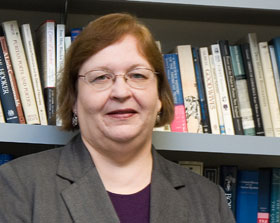  |
| HOME | THIS ISSUE | CALENDAR | GRANTS | BACK ISSUES | < BACK | NEXT > |
English professor studies early American works by womenby Sherry Fisher - March 26, 2007 | ||||
| In the mid-1980’s, when Sharon Harris was a graduate student taking courses in early American literature, only a few works by female writers were offered for study. “I started thinking there had to be more women writers in that era,” says Harris, now a professor of English. She embarked on some research, and finding early American female writers became her passion. “It shaped my career,” she says. “Now it’s a huge part of early American studies and has become a major part of the field.” Harris, who joined the UConn faculty in 2005, has published 10 books, including critical studies and collections of scholarly essays on early female writers. She says she takes a cultural approach to literature: “I think it’s important to know a culture as well as the literature in which that culture was produced.” She notes that female writers in the past explored the political and social issues of the day, as did their male counterparts. “For instance, during the era of the Revolutionary War, when the major topic was the issue of liberty, women – who didn’t have citizenship rights or the right to vote – entered into that discussion,” Harris says. “Some did it by writing political essays, and some wrote novels.” Many women first expressed themselves in letters and diaries, says Harris, but others were more outspoken. “Some major women writers of the late 18th century, including Judith Sargent Murray, were very public in their comments.” In 1790, Murray published an essay called On the Equality of the Sexes. Harris’s most recent critical analysis, Executing Race: Early American Women’s Narratives of Race, Society, and the Law, was an outgrowth of research she initially did for another book, American Women Writers to 1800. Harris juggles half a dozen research projects at a time. One of them is a history of feminism, starting with the Greek poet Sappho through the present. Another is a biography of Dr. Mary Walker, an early 19th-century physician, activist, and nonfiction writer. Harris spends a good deal of time researching Walker’s papers in archives in Syracuse, Philadelphia, and Washington, D.C. “Dr. Mary Walker is just amazing,” she says, noting that Walker was the only woman to serve as a surgeon during the Civil War; the first woman to run for the U.S. Senate in the 1880’s; and the only woman ever to receive the Medal of Honor. “She was also involved in dress reform,” Harris says, “and this scandalized people. She began to wear pants with a skirt over it, and then went strictly to pants. As a surgeon, she said she could not perform surgery in long skirts.” She was so well known in her day that the New York Times and the Washington Post referred to her as “Dr. Mary,” says Harris.
She says conducting her research, as well as writing it up, has been a “wonderful education. “You start a project like this, thinking that you absolutely know the 19th-century – I’ve been teaching this subject for 20 years – and then you begin to discover things that were happening that you never knew about,” Harris says. “I just love that part of it.” When she’s not searching through boxes to find pieces of information, she’s talking to archivists. She says building relationships with archivists is important: “They need to understand what you’re doing and why you need access to material.” Harris brings ideas from her research into the classroom: “If I’m teaching the period of the Revolution, I include Abigail Adams’ famous letter to John Adams, saying, ‘Remember the ladies when you think about this new form of government.’ He wrote back and said, ‘Here’s a new faction emerging that I hadn’t thought about.’ So it’s integral to the way in which I teach.” Harris’s dissertation and her first book were about Rebecca Harding Davis, who in 1861 wrote a text called Life in the Iron Mills. “I had been considering writing my dissertation about Jonathan Edwards, but I came across a short story of Davis’s and became fascinated with what she was doing,” Harris says. “She was working in realism at what was then considered a really early period. “Again, what fascinates me is when I think I know something, and a text comes along and I have to rethink a field or an area that I thought I knew about,” Harris says. “To me, that’s the most exciting part of my intellectual life.” Harris says that as a teacher she hopes to “create an excitement about intellectual exploration so that students want to read beyond what is assigned.” She also tries to help students learn to think critically: “If students can think critically in reading literary texts, they can transfer that to the newspaper, to business reports, and to other areas of their lives.” She is at the early stages of developing a web site about early female writers in America that would make primary texts by these early writers easily accessible. She says that even with 10 books published and six others in the works, “I don’t think I’ve even begun my career. There is so much that I want to do.” Adds Harris, “That would be a trait I’d like to pass on to my graduate students – that your educational life never ends.” |
| ADVANCE HOME UCONN HOME |

